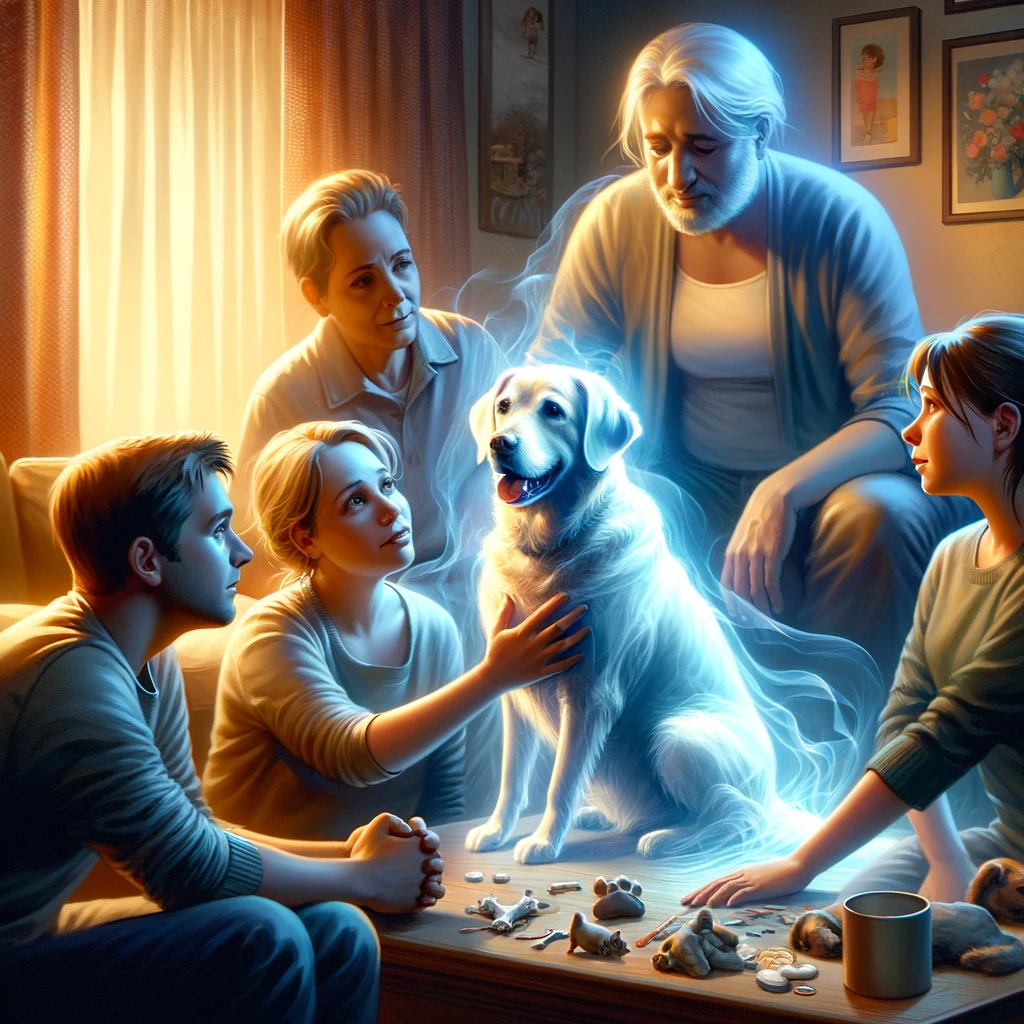The loss of a pet is a profound and deeply personal experience that can evoke a spectrum of emotions, from sorrow and loneliness to fond remembrance of the joy and companionship these beloved animals brought into our lives.
This article delves into the emotional impact of losing a pet, exploring the powerful bond between humans and their animal companions, the varied ways families navigate this loss, and the avenues available for support and healing.

Key Takeaways
- The loss of a pet can trigger grief as intense as the loss of a family member.
- Each family member may experience and process the grief of losing a pet differently.
- Counseling, creating memorials and joining support groups can play a crucial role in navigating the grieving process.
- Stories of love and joy from other pet owners who have overcome their grief can help you heal.
- Deciding to welcome a new pet after a loss requires careful consideration.
Emotional Impact of Pet Loss
Losing a pet can elicit a grief response as intense as the loss of a human family member.
In this article on Coping with Losing a Pet, HelpGuide.org says this:
“Many of us share an intense love and bond with our animal companions. For us, a pet is not “just a dog” or “just a cat,” but rather a beloved member of our family, bringing companionship, fun, and joy to our lives.
A pet can add structure to your day, keep you active and social, help you to overcome setbacks and challenges in life, and even provide a sense of meaning or purpose. So, when a cherished pet dies, it’s normal to feel racked by grief and loss.“
Your pet was a significant part of your life, and the grief you feel is a natural reaction to their absence. Acknowledge the importance of your loss to understand why you are experiencing such deep emotions.
Impact on the Family

The loss of a pet can reverberate through a family, touching each member in profound and individual ways.
Pets are not merely animals living among us; they are cherished family members, companions in life’s journey, sources of unconditional love and support.
When a pet passes away, the void left behind can feel overwhelming, impacting the emotional wellbeing of the entire family unit.
For children, the loss of a pet might be their first encounter with death, shaping their understanding of life’s impermanence. It can evoke a wide range of emotions, from confusion and fear to profound sadness.
Adults, too, feel the loss deeply, often grappling with the decision-making process around end-of-life care, and potentially questioning their choices long after their pet has passed. The collective grief of a family can be complicated, with each person processing the loss at their own pace, sometimes in isolation, and at other times, seeking solace in shared memories and experiences.
Moreover, the daily routines of family life are altered in the absence of a pet. The spaces once occupied by the pet, the routines of walks, feedings, and playtime, now serve as reminders of the loss, triggering grief anew.
The dynamic among remaining pets can also change, as they too sense and react to the loss, further affecting the family’s emotional landscape.
Navigating this period requires open communication, patience, and understanding. It’s important for family members to support one another, recognizing that each person’s grieving process is valid and significant.

Grieving and Counseling After Pet Loss

When you lose a pet, the pain can be profound. This section provides insight into the grieving process, helpful ways to manage your loss, and resources for gaining support, including seeking guidance for children.
Dealing with Loss
As you navigate through your grief, it’s important to recognize that everyone’s journey is personal. Some strategies to manage your grieving process could include:
- Remembering the good times by creating a memory book or box.
- Commission a piece of art, such as a painting, drawing, or sculpture, to memorialize your pet. This can be a beautiful way to celebrate their life and keep their memory alive in your home.
- Allowing yourself to feel sadness as well as relief, especially if your pet was suffering.
- Reaching out for support from friends, support groups, or professional counselors.
Support Resources
Outside support can be invaluable and can be a comforting source of sympathy and compassion. Consider the following:
- Engaging in one-on-one sessions with a grief counselor or joining support groups that can be found through resources such as the Association for Pet Loss and Bereavement.
- Contacting a pet loss help line can help you through the grieving process as well.
Counselling for Children After Losing A Pet

Children often have a unique bond with pets and might not understand the permanence of the loss. It’s crucial to approach their grief with special care:
- Be honest with children about the pet’s death in a language that is age-appropriate.
- Encourage them to express their feelings and memories about the pet.
HealthyChildren.org, in their article When A Pet Dies, How To Help Your Child Cope, suggests the following:
“Explain your own sadness: If your emotion isn’t obvious, this may confuse your child. It’s okay to let them see you cry. Keep in mind though that not all children—whatever their age—express their grief through sadness.
Anger is also a common way to express grief. Understanding this is important so you can help them learn to work through it.
Remember, grief-related emotions can come and go, sometimes without warning. It may take longer than you thought for your child to get through this period. Be sure to let your pediatrician know if your child is having more serious symptoms such as sleep disturbances, anxiety or depression.”
Sharing With Other Pet Owners

When you lose a pet, it can be a time of profound sadness, but also a period to reminisce about the love and joy shared. Here, pet owners like you share their experiences, offering understanding and a sense of closure.
Stories of Love and Joy
Love and joy are recurrent themes in the stories pet owners share about their time with their animals. Many recount the daily happiness their pets brought them, from exuberant greetings at the door to quiet companionship.
Sharing these stories with others around you could help you remember the good times and provide emotional healing over time.
Learning from Others

Engaging with others’ stories can be incredibly comforting. Learning how others have navigated the journey of losing a pet can provide practical advice and emotional understanding.
Organizations such as Paws & Remember facilitate support among grieving families, part of an invaluable network of shared experiences and support.
Personal Stories of Closure
Achieving closure is a personal journey, and it varies greatly among pet owners. Many have found that customized memorials or urns received from cremation or memorial services can play a crucial role in this.
Personal stories often highlight how creating a lasting tribute allows for an enduring connection to the joy and love the pet offered in life. Partaking in local community or Facebook groups for pet owners could provide another avenue of support.
When to Consider Getting a New Pet
Deciding when, or if, to welcome a new dog into your life after experiencing the loss of another can be a profoundly personal and often complex decision.
Grieving the loss of a dog is a unique journey for each individual, and the timing to consider adopting or purchasing a new pet varies significantly from one person to another.
It’s essential to navigate this process with sensitivity and introspection, ensuring that the decision to bring a new pet into your home is made with consideration to your emotional readiness and the capacity to form a new, healthy bond.
Pets In Peace mentions the following guideline:
“Some people really struggle with losing their pet, especially in the case of pets that provide emotional support to their owners.
Sometimes in order to move on, another pet may assist with the grieving process…
… That being said, it’s important to take some time to process the loss of your previous pet before embarking on getting a new one. However, no one can stipulate how much time you need; it could be weeks, or months, or days, depending on the owner.”

The idea of a new pet is sometimes met with feelings of guilt or betrayal to the memory of the dog that has passed. It’s crucial to recognize these emotions as a natural part of the grieving process.
Acknowledging and working through these feelings can help clarify whether you’re considering a new dog for the right reasons — not as a replacement, but as a way to open your heart to another being in need of love and companionship.
Remember, loving another dog does not diminish the love you had for your previous pet; rather, it can be a testament to the strength and depth of that bond.

When contemplating a new dog, consider the dynamics of your current household, including the needs and feelings of family members and any other pets that may be affected by a new addition.
Each member of the household should have space to express their feelings and thoughts on the matter.
Additionally, reflect on the practical aspects, such as the time, energy, and financial commitment required to care for a new pet, ensuring you can provide a loving and stable environment.
Conclusion

In conclusion, the journey through grief following the loss of a pet is as unique as the bond shared between humans and their animal companions. Recognizing and honoring this grief is crucial to healing, as is the support from family, friends, and professionals who understand the depth of this loss.
Through remembering, sharing, and perhaps eventually welcoming a new pet, we pay tribute to the irreplaceable presence our pets held in our lives. The process of grieving and healing underscores the profound impact these companions have on our emotional and psychological well-being, reminding us of the capacity of the human heart to love, lose, and love again.
Finally, do not hesitate to seek our counselling services to help you through your journey through grief..



